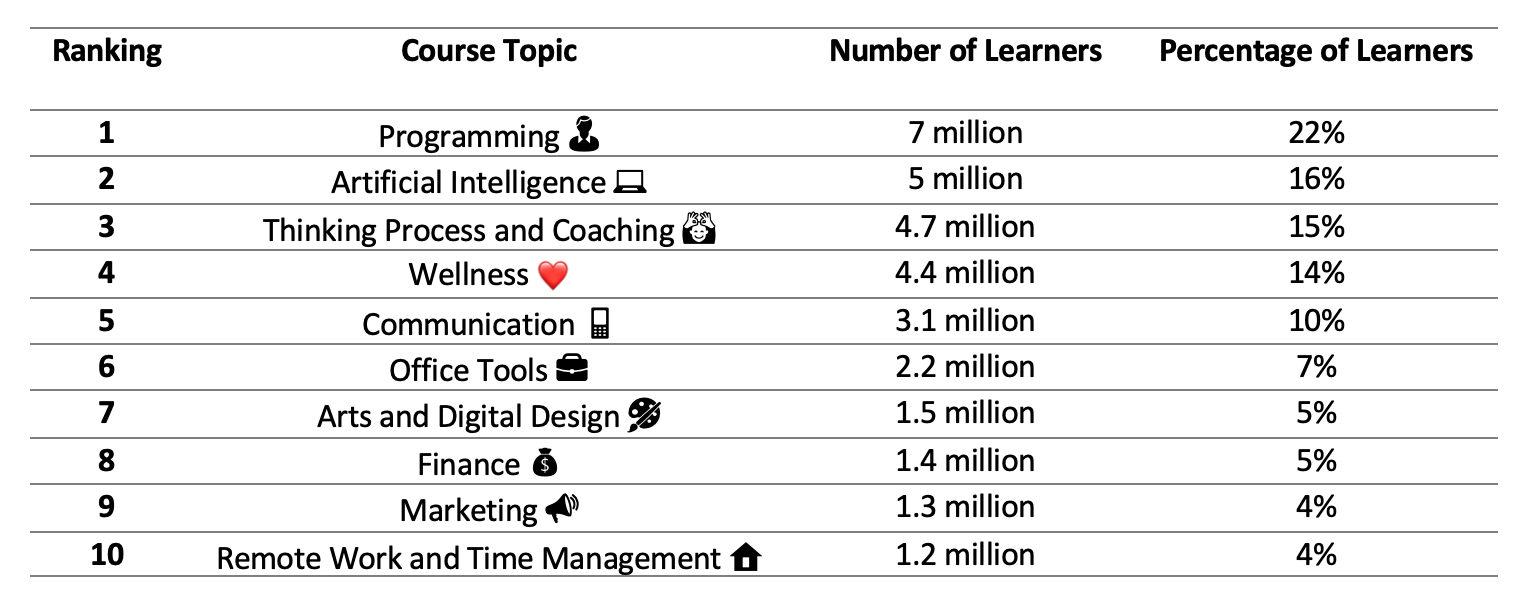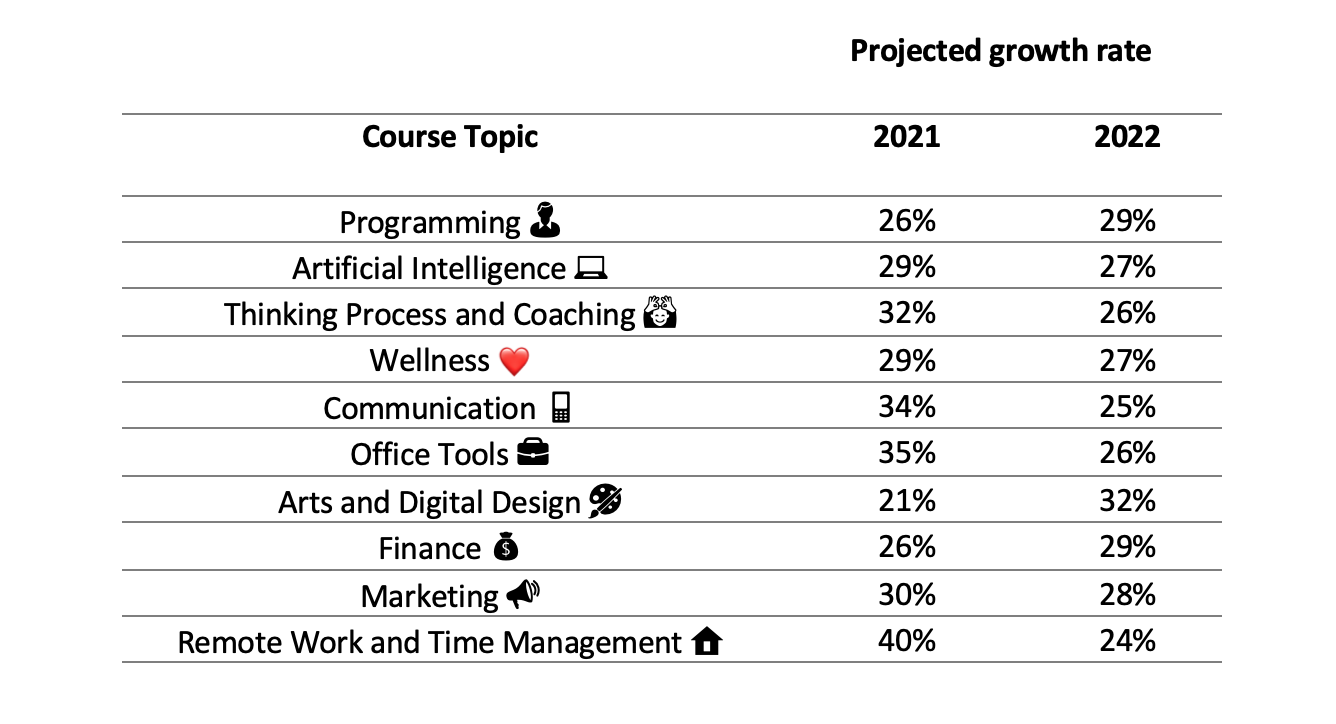Attention Online Creators: Ideas for Your Next Online Course
By Kerri Agnew
Online learning has grown in popularity over recent years, and during the Covid-19 health pandemic, most face-to-face learning went online at one point or another, revolutionising how we approach learning.
Online learning has never been more relevant, and providing an online course can be practical, rewarding, and highly profitable. Getting started is easier said than done, but in this article, we will tackle the most important part of getting started with your course: your topic.
We will review recent data on the market for online courses and outline the top niches for you to create your course now. This article will provide key takeaways for course providers on what courses may be profitable now and in the future.
Let's start by discussing the growth of online courses.
The history of online learning
Online learning is relatively well established in the UK, providers started delivering these courses in the 1990s.¹ Online provision continued to increase during the millennium and started to take off when MOOC (Massive Open Online Course) platforms established themselves, such as Udemy in 2010.
Udemy started in 2010 with 10,000 registered users, and now boasts more than 40 million learners in 2021. Another notable provider Coursera launched in 2012, and Skillshare in 2011. Most recently in 2015, LinkedIn Learning launched when LinkedIn acquired lynda.com (founded in 1995).
What effect did the pandemic have on online course demand?
Online education surged during the pandemic year, as classroom learning transformed into e-learning, and homes into workplaces. People have realised the benefits of online education, such as it being less costly, with flexible hours, and a useful source of self-development given the variety of courses on offer.
Evidence from web searches in the UK, Canada, France, Italy, and the United States, show a marked increase in searches for terms like 'online learning', 'e-learning', and references to MOOC platforms.² Searches for these terms increased up to fourfold between the March and April 2020 as strict lockdown rules came into force across most developed countries. Research also shows that the number of worldwide learners using Udemy, Coursera and LinkedIn Learning doubled between 2019 and 2020, up from 25% growth the previous year.³
Who is studying online?
Recent data from the Office of National Statistics show that online courses are popular among 16 to 54 year olds in Great Britain; those aged 25 to 34 years old are most likely to use an online course, while those aged over 65 are least likely to register for an online course. The data also shows that men are slightly more likely than women to register for an online course.
What are they studying online?
There is no robust publically available data on the volume of learners studying online courses in the UK, but based on data of 32 million worldwide learners using Coursera, LinkedIn Learning, and Udemy, RecoMind estimated that the top 10 courses across those platforms include programming, AI, thinking and wellness, finance, and remote work. They estimate that in 2021, 203,192 courses are available across these three platforms, and that the global online e-learning community has a market size of $228 billion (£164 billion).
The Top 10 Course Topics across Coursera, LinkedIn Learning, and Udemy in 2020

Notes: numbers are rounded to the nearest decimal place. 'The growth of online courses' data spreadsheet is downloadable from recomind.io/resources/growth-of-online-courses.html
As programming is basic literacy in the digital age, it is no surprise to see it in the top 10. Popular in this area are courses like python coding, ethical hacking, and web development. Over the pandemic year, most of us learned the importance of self-care, and unsurprisingly documented in the top 10 is the rise in popularity of self-development courses, such as thinking process and wellness. Given the global transition from office to remote work, it is expected to see remote time management courses rise in popularity, as people try to navigate this new way of working.
What online courses will be popular in the future?
Demand for online learning is expected to grow significantly over the next few years, especially as unemployment rises and as job seekers attempt to refine their skill sets.⁴ Although lockdowns and restrictions are temporary, the pandemic has normalised the use of technology in our everyday lives and individuals have become accustomed to digital learning.
Projected growth rates across Coursera, LinkedIn Learning, and Udemy's most popular courses

Notes: numbers are rounded to the nearest decimal place, estimations are based on sources and an algorithm. 'The growth of online courses' data spreadsheet is downloadable from recomind.io/resources/growth-of-online-courses.html
All of the highly ranked courses on these platforms are forecast to continue growing next year. This year, remote work and time management courses are expected to grow the fastest. Indeed employers expect remote working is here to stay, with some citing a flexible arrangement between office and homework after restrictions ease.⁵ In 2022, Arts and digital design are expected to see the largest increase in learners, courses such as photography and digital drawing are included in this category.
What should my next online course be?
Ultimately, we cannot answer that for you, many considerations go into deciding what course to deliver, such as your expertise and your budget. A fundamental consideration though, is whether or not there will be demand for your course. We hope this article helped you decide what course to deliver next, or at least gave you a few ideas!
References
-
Review_of_the_online_learning_and_artificial_intelligence_education_market_for_upload.pdf
-
'The potential of online learning for adults: Early lessons from the COVID-19 crisis', OECD Policy Responses to Coronavirus (COVID-19) available at:
-
Online Education & Training in the UK - Market Research Report
-
'UK Companies say remote working is here to stay', Willis Towers Watson, available at:
Related Posts
Insights and online course ideas from the Salesforce Trailhead learning platform
What are the essential features of good online course design?
Online course delivery platforms for training providers
The easiest way to turn face-to-face training into an online course
